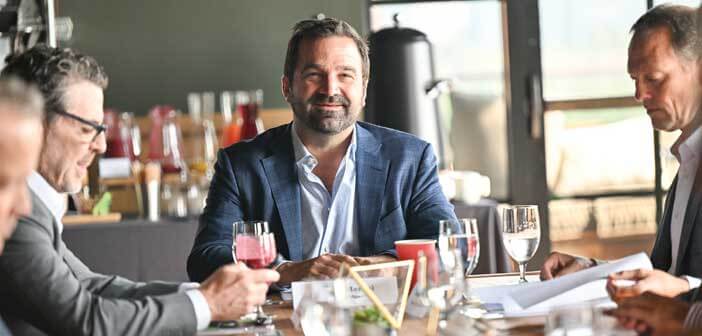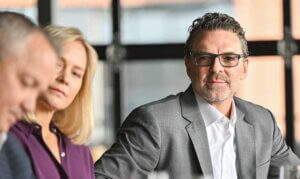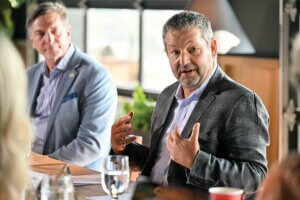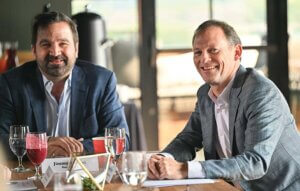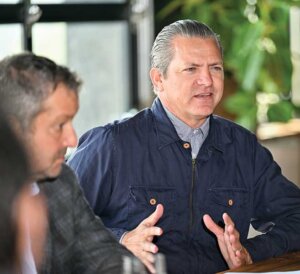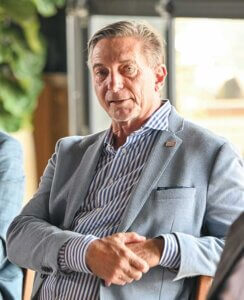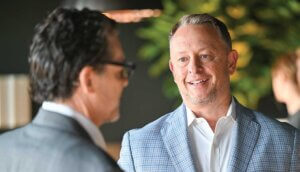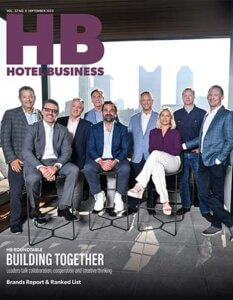We’re stronger together. And a collective spirit can often solve problems and stand up to challenges that may seem insurmountable. By exploring ideas, discovering opportunities and creating solutions together, we can build stronger bonds, stronger relationships, stronger team members and stronger companies.
Hosted and sponsored by Rockbridge, Hotel Business held an executive roundtable in Columbus, OH, to take a deeper dive into this idea, and to provide insight on why this model works, best practices to guide your teams, real-life experiences to inspire, and thought leadership about this approach to management.
The event was held during last month’s RTRX event, founded by Rockbridge CEO/cofounder Jim Merkel in 2012, and brought together industry professionals and thought leaders all looking to make a difference. The RTRX experience, held in collaboration with Pelotonia’s Ride Weekend, is curated with business, philanthropy, fun and thought-provoking and inspiring content. This year’s theme centered around coming together and building community through shared experiences to celebrate the power of unity and understanding in a divided world.
Moderated by Hotel Business’ Christina Trauthwein, VP, content & partnerships, the roundtable participants were Merkel; ; Chris Green, president, Remington Hospitality; Mark Tamis, president, global operations, Aimbridge Hospitality; Chuck Pomerantz, managing partner, Highline Hospitality; Lisel Morris, director, branding + strategic projects, AMS Hospitality; Michael Kollin, founder/president/CEO, Kollin Altomare Architects; Sloane McFarland, restaurant and creative entrepreneur, Martha + Mary; and Teague Hunter, president/CEO, Hunter Hotel Advisors.
The roundtable was held at The Junto hotel, a newly opened, independent lifestyle property brought to life by Rockbridge and Makeready (see sidebar story on page 26).
The conversation began around the RTRX event itself, and what it means to each of the participants. There was a consensus among the group: The event not only inspires each of the leaders but forces them to take a step back and analyze their priorities.
“It’s really inspiring to hear feedback about the intention of the event—to do something different and bring people together on universal issues that could apply to us whether we’re working or at home or in our community,” Merkel said. “What it’s done for me, personally, is it allows me to build deeper relationships with people. It brings out conversations, and we learn on a deeper level. That’s really a joy for me in this business—building relationships.”
In a business of relationships, sometimes it’s easy to lose sight of how those relationships were forged, and much easier to focus on numbers and day-to-day deals. And not just relationships with colleagues and associates, but relationships with hotel guests.
“Everything about this conference is about inspiration and soulfulness and connecting with human beings—and not once did I hear anyone talk about driving the bottom line,” Morris said. “Of course, that’s going to be an inherent byproduct, but it was so refreshing. We’re selling happiness, and to sell happiness, you have to understand what makes somebody happy. That person isn’t thinking about the bottom line. They’re coming wanting to be seen, heard and understood. Coming here and spending three days focusing on what lights people up and makes them feel cared about is a great reminder.”
As industry leaders, the execs agreed that they all have the power to ignite change and inspire others, but for that to be successful, there must be a level of authenticity and trust.
“The word trust comes up in every relationship,” Healy said. “When you think about what made you successful as a younger person, that gets chipped away. Don’t forget there are people looking up to you. Your energy sets a tone. Why RTRX is so brilliant is because that’s what is really important. We can close the deal, but we’ve got to like each other, trust each other and respect each other. All of the soft stuff matters.”
Making changes
Putting these plans into motion is critical, and the roundtable participants shared how they’re going to start making changes within their own organizations.
“I need to go back and think about how we should talk about fun and motivation because it’s all going to translate to better performance,” Pomerantz said. “It’s on me to go back and say, ‘OK, how do I hold my management companies more accountable to do that?’ We should be getting out into the field and celebrating the successes. It’s on me to do that and get myself reenergized and motivated.”
Others, like Kollin, have plans to take what they learned back to their teams so they can implement these principles for themselves.
“I show up [to RTRX]because I believe, as a leader, it’s important to be able to go back and share with my staff the things that I’ve learned here,” Kollin said. “I’ve learned to collect and connect the dots, and while I think we do this generally in business, I’ve never really put it that way before. It’s a great way to continue with those connections.”
Green believes in this type of leadership as well, and thinks that it can be transformational for the hospitality business.
“People don’t get enrolled in how your GOP was last month, but they do get enrolled in if you understand how they feel,” he said. “I always say that we may talk about culture in the C-suite, but it doesn’t matter if it’s not true in the field. True looks different for those in the field than it may look for me.”
He shared a personal story about culture in the field; it’s a moment that the executive says changed his life. “One of the most transformative moments in my career was with a lobby attendant 25 years ago,” Green recalled. “I was going at a thousand miles an hour as an assistant general manager of a hotel, and I was walking through the lobby fast, and I thought I was a hospitable, friendly leader. The attendant said, ‘How are you?’ and I said, ‘Fine, how are you?’ and kept walking, and she said, ‘Do you even care?’ I stopped dead in my tracks—and that literally changed my career because I realized that I had prioritized process over people.”
For Green, this moment taught him to be present and to focus on what matters, as this quality ultimately breeds a stronger, more authentic leader.
“When I see someone in the lobby or in line for coffee [at this event], I ask them, ‘Why are you here?’ and I realize [RTRX] is set up for relationships like that to just pop up,” McFarland noted. “We’re in a tough industry. How do we solve these problems? How do we have teams and employees and care about their health? Part of that is we need to rethink what our teams are like. I’m expanding my vision of that.”
Genuine leadership
Making team members and guests feel seen and heard is no easy task, especially in the tech-congested world we live in, as we’re being pulled in numerous directions at once. However, Hunter believes a leader can’t and should never fake happiness or optimism—it must be genuine.
“I don’t think you can fake it; I think it’s what you’re doing all day every day,” Hunter said. “I text my daughter every morning, ‘It’s going to be a great day.’ I walk into the office and smile, stay positive and ask, ‘Who’s excited to be here today?’ It’s infectious. People feel it even in this really difficult transactional environment.”
It’s this kind of optimism that spreads to team members and eventually down into the field and to the guest.
“I’m really bullish—most of you are as well—and I’m an optimist by nature, but if you look at what’s going on in the world and how travel is exploding, I believe experiences are what people want because they are so busy and want these escapes to feel like they are part of a community and are present,” Merkel said. “Our job in the hospitality business is to provide that experience and escape and create those opportunities.”
RTRX is a way to inspire all of its attendees, whether seasoned industry veterans or curious young ones. Merkel explained that one of the things that he’s loved about the event from the beginning is that attendees’ children are welcome to experience it.
“What better way to share with the next generation what good looks like,” he said. “I’m a big believer in getting people in the room. What we do isn’t rocket science. It’s hard, but it’s doable for everybody to have that model of what good business looks like. Good business is being in a community and making the world a better place. That’s part of giving back to the community, giving back to the next generation.”
The execs also spoke about putting these ideas into motion and seeing the power of people. For Healy, this means turning his own passion into an employee exercise.
“You have to find something that connects people,” said Healy, who encourages team members to pick a song every week and share a story behind its personal meaning to them. “I put out what was a vulnerable email, and I shared a song, and then we put out a list of everybody’s songs.”
Some people’s stories are funny, some heartfelt, but every Wednesday at 9:00 a.m., an employee’s song of choice plays throughout the office and associates read their email along with it.
“It was my little passion that helped try to connect people,” Healy said. “The storytelling brings everyone closer. When you think about community and inspiring people, how do you get them to participate? You have to get them at an emotional level. When you connect with people at that level, you figure out what triggers them and then you can help design things where everyone feels like they’ve participated.”
Employee optics
It’s also essential that employees view their leaders as empathetic, approachable people to encourage environments of growth.
“It’s about vulnerability, transparency and authenticity—and being willing as a leader to let your guard down and be human,” Green said. “If you think about leaders who you want to follow, you know them at a human level—not just that they’re an inspiring leader because they’re well-spoken, smart or successful. That’s how you enroll people. They know you as a human.”
Green said that there are days he comes into the office and is honest with his team about not being at 100%. But, for him, it’s about being OK with not always being OK.
“How many of us think of wholeness as a P&L item?” he asked. “We probably don’t, and we probably need to.”
Morris said that being open with your team in this way is brilliant because it’s not making anybody else responsible for your emotions.
“I think that with vulnerability, there is no longer a true hierarchy in the regard we knew it before,” Morris said. “Talk about the efficacy and the dynamics of a team—that can be that vulnerable. That’s an opportunity for leadership.”
As a leader, Merkel said, it’s important for him to not only hear what team members are going through, but to get down in the trenches with them.
“I have to feel and be a part of it to understand what people are going through,” he explained. “I can do better on the process or operations side, but if I feel it, I can connect and provide people with solutions.”
The world has certainly changed in the past few years, but even prior to the pandemic, the workplace was evolving. Hunter noted the old-school, militaristic hierarchy of the American workplace, which is now quite the contrary.
“We were soldiers not thinking, just doing,” Hunter said. “You weren’t following a person, you weren’t feeling. And now, it’s totally the opposite. The lowest person on the totem pole has thoughts, opinions and ideas that may be different from us as leaders, but we want to hear that and create a safe space to encourage it.”
He added, “People don’t want to follow you because they have to. They follow you because they choose to. We can do this better together than I can by myself.”
Business, personal and social lives are also blending much more than they have, Tamis said. And with exposure and access to so much, especially on social media, giving people a sense of belonging is essential.
“Making people feel a certain way is so important now,” Tamis said. “We always talk about a sense of belonging, and I really feel at every level that’s what people want. Whether you’re a housekeeper, server or general manager, you want to belong to something bigger.”
This is something that drew Merkel to hospitality—making a difference in people’s lives and making their voices heard.
“I feel super fortunate to come into this industry by happenstance, but it’s building that community where we can make a difference,” he said. “Anybody can engage with hospitality. You don’t need a degree for it. You need to be a team player and hard worker and want to learn. When you think like that, we can make a big difference in our industry.”
Telling the stories
It’s stories like these that need to be told, Kollin said, to attract hard-working, motivated people to hospitality. If current associates can see this in their leaders, they’re more likely to stay on the team.
“The more your team members hear about that, the more respect you can get from your team and help them to visualize it,” he said. “Give your team the ability to speak to you honestly, which doesn’t come very easily, and take advantage of it.”
Pomerantz believes this also breeds loyalty and gratefulness. “Tomorrow is a new day to start over and pick yourself up,” he said, adding, “We’re just lucky to be here. It is impactful to be vulnerable. It makes it real. People I’ve mentored through the years and have worked for me, they want to keep working for me, and they’ve taught me a ton. They know I’d go through a wall for them.”
Healy brought up an interesting point that true loyalty like that is rare, which makes authenticity so critical.
“If it wasn’t for my ability to help people and have influence, would they still participate?” Healy asked. “That’s a really hard question. You want to believe it’s authentic. Are they doing it because they care or because I can influence things?”
What leaders should focus on is always remaining authentic with their teams and never taking any associate for granted.
“I see leaders as those people who have people around them because they just want to be around them and experience their energy, motivation and drive that engagement and positivity—that’s true leadership,” Green said. “Leading when you don’t have the title—that’s real leadership to me. I believe in that. I always just say I’m a senior team member. No role is more important than another. I wouldn’t have a job if housekeepers didn’t turn rooms.”
To help better himself, the Remington executive vows to take more time for self-reflection and development.
“For my team, it’s about giving them the space to realize, ‘It’s OK, you’ve got to invest in your health and ability to be present, otherwise you can’t be your best self,’” Green said. “People have lives. We’re all human first.”
Taking a step back and prioritizing can make a team not only be more understanding of one another, but stronger. It’s about getting back to those core principles.
“We’re all hamsters on a wheel, and we have to refocus as to why we’re doing what we’re doing and how that can drive performance and value,” Healy said. “We have to step off the wheel.”
Having a line item for joy in your budget can also help. Morris suggested giving each person the freedom to do what makes them thrive.
“Give a little bit of joy to each person and let them have agency with it,” she said. “Perhaps, have people on a joy committee and do random things [to create and spread that joy].”
Tamis said that, for him, it often goes back to remembering the “why” behind what he does, and it’s all about creating opportunities for others.
“We all started somewhere as a dishwasher or housekeeper or supervisor, and you kind of forget it as you go up,” Tamis said. “People look up to you, and we don’t often get the opportunity to think about ourselves, even at other conferences. Here we’re talking about joy— you never get a chance to think like that.”
Joy can be found every day, especially in hospitality, but it’s about slowing down to find the successes and celebrating them, big or small.
“You have to take time to slow down, notice those moments of joy and spend time with the team,” Merkel said. “We’ve gotten away from that.”

